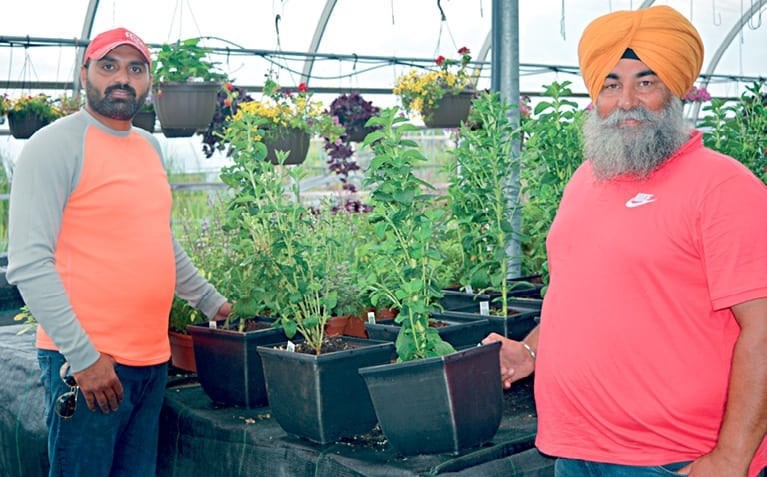BY GLORIA J. KATCH Special to the VOICE
“Agriculture is our wisest pursuit, because it will in the end contribute most to real wealth, good morals and happiness,” read the quote by one of America’s founding fathers, U.S. president Thomas Jefferson, inscribed on Amanjit Josan’s business card.
He and his wife, Gurwinder, are owners of Nature Lovers’ Greenhouses and Landscaping, which spans 100 acres over three properties, and two of those acres are covered in greenhouses in Pelham and Beamsville.
Seeing the several lushly green fields and greenhouses filled with 15 varieties of melon, gourds, as well as other specialty Asian vegetables, fruits, herbs and flowers on Foss Road and Highway 20, it’s easy to see how Josan’s moral and religious philosophy are interconnected with his business.
As an East Indian Sikh with a green thumb, one of Josan’s goals is to help erradicate poverty through education in horticulture. Having studied horticulture in India, and then putting that knowledge into practise there, and in Belgium, Holland, as well as in Canada, he is the quintessential teacher.
“I’ve travelled the world three times over looking at horticulture,” he said, adding, “Vineland and Guelph don’t have this kind of research here.”
He documents many of his experiments, and concludes he knows what works, and what doesn’t.
After a profile on Josan published in the Voice last year, he said many farmers approached him with their questions and concerns about growing. Josan is clearly happy to dip into his deep well of knowledge for anyone willing to work toward sustainability.
Josan has done research on different aspects of horticulture, and experiments constantly with different types of fertilizers and soils, including coco peat, which is made from the coconut plant. The coconut husks help retain moisture in the soil and allows him to grow many Asian vegetables in his greenhouse, such as gourds, watermelon, bitter melon and tinda, which are usually imported.
Unfortunately, anyone purchasing these types of vegetables as imports, asserts Josan, are not buying safe products, as certain countries do not have restrictions on pesticides or pollution levels, which contaminate the soil.
Josan is a believer that the body is ones temple, and says food is one of the most overlooked, but important aspects in our lives.
That’s why he can’t understand how people can shop in the “cheap food aisles” for foods that are not safe. Josan introduces certain insects that prey on other insects as a natural pesticide. None of his produce is genetically modified. He also built his own irrigation system for $1,500 that irrigates an entire 25 acres in one day, and has no chemicals. In India, he also started a seed-producing business that was successful, and is pleased with how many people it helped. These types of systems are particularly ideal for Third World countries, because they are economically viable startups, he said.
Josan experiments with producing better yields using sheep, goat and fish manure, coco peat and other variations. After his many years of experience, one of his goals is to teach other farmers to become sustainable, and educate the public to shop local, and not rely on imports. He also believes the Asian community should be able to purchase its fruits and vegetables locally, particularly since their populations seem to be rising in Canada.
Similar to the Fair Trade movements in Central and South America, Josan also has a group of impoverished women in rural India making coco products and coco shells that have become large hanging baskets and planters, instead of using plastic products. He acknowledges how detrimental plastics are to the environment and eco-systems. Coco shell planters are particularly great for growing bitter melons, a fruit that has flowering stems and is popular among Asians.
Josan also grows Stevia, which has become known as a sugar substitute, and helps those who are predisposed to becoming diabetic. Freeze-dried and sold in packages to resemble sugar, Stevia is about four times its cost. Nature Lovers sells many Stevia plants, starting from four to five inches tall directly to consumers. The leaves can be taken off the plant and eaten, and don’t require drying, he said. Josan also recommends winter gourd and tinda for diabetics as well. With all the diseases in the world, natural foods like these are required to maintain optimal health, he said.
The idea of sustainability is affordability, and Josan wants to produce enough food to be able to donate to charitable foundations to feed the poor.
“They should have fresh food, and not just leftovers,” he added.
Although Josan studied marijuana horticulture in Holland years ago, he is not interested in growing the weed. While he maintains medical marijuana has many health benefits, he doesn’t agree with it being used recreationally. He fears that vehicle accident rates will rise because breathalizer tests will not be able to accurately measure levels of intoxication. India’s experience with marijuana is grim and sobering at best, with many youth eating too much of it, and dying from toxicity, only to be found in fields or by the roadside days later.
“Canada could definitely learn a lesson from India’s experience,” he said.
Josan and his wife came to Canada in 2002. In the last week, other members of his family arrived from India, and in a year or two they will be taking over and managing his farming business.
“That is the next generation,” he said proudly.
For Josan, it is a time for planning and reflection. Expansion is in the winds. Josan admits he wants to buy 50 more acres locally for farming specialty crops.
“We have a moral responsibility to start growing our own foods,” he added.



